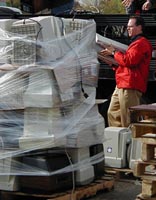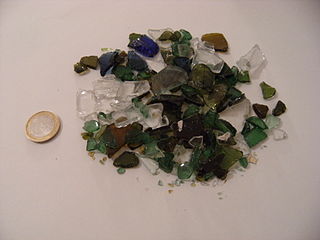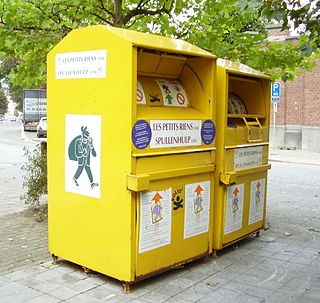
Waste management are the activities and actions required to manage waste from its inception to its final disposal.
This includes the collection, transport, treatment and disposal of waste, together with monitoring and regulation of the waste management process.

Greywater or sullage is all wastewater generated in households or office buildings from streams without fecal contamination, i.e. all streams except for the wastewater from toilets. Sources of greywater include, sinks, showers, baths, clothes washing machines or dish washers. As greywater contains fewer pathogens than domestic wastewater, it is generally safer to handle and easier to treat and reuse onsite for toilet flushing, landscape or crop irrigation, and other non-potable uses.

Reclaimed or recycled water is the process of converting wastewater into water that can be reused for other purposes. Reuse may include irrigation of gardens and agricultural fields or replenishing surface water and groundwater. Reused water may also be directed toward fulfilling certain needs in residences, businesses, and industry, and could even be treated to reach drinking water standards. This last option is called either "direct potable reuse" or "indirect potable" reuse, depending on the approach used. Colloquially, the term "toilet to tap" also refers to potable reuse.

Zero Waste is a philosophy that encourages the redesign of resource life cycles so that all products are reused. The goal is for no trash to be sent to landfills, incinerators, or the ocean. Only 9% of plastic is actually recycled. The process recommended is one similar to the way that resources are reused in nature. The definition adopted by the Zero Waste International Alliance (ZWIA) is:
Zero Waste: The conservation of all resources by means of responsible production, consumption, reuse, and recovery of all products, packaging, and materials, without burning them, and without discharges to land, water, or air that threaten the environment or human health.

Plastic shopping bags, carrier bags, or plastic grocery bags are a type of plastic bag used as shopping bags and made from various kinds of plastic. In use by consumers worldwide since the 1960s, these bags are sometimes called single-use bags, referring to carrying items from a store to a home. However, reuse for storage or trash is common, and modern plastic shopping bags are increasingly recyclable or biodegradable. In recent decades, numerous countries have introduced legislation restricting the sale of plastic bags, in a bid to reduce littering and plastic pollution.

Computer recycling, electronic recycling or e-waste recycling is the disassembly and separation of components and raw materials of waste electronics. Although the procedures of re-use, donation and repair are not strictly recycling, they are other common sustainable ways to dispose of IT waste.
Adaptive reuse refers to the process of reusing an existing building for a purpose other than which it was originally built or designed for. Adaptive reuse is an effective strategy for optimizing the operational and commercial performance of built assets. Adaptive reuse of buildings can be an attractive alternative to new construction in terms of sustainability and a circular economy. Not every old building can qualify for adaptive reuse. Architects, developers, builders and entrepreneurs who wish to become involved in rejuvenating and reconstructing a building must first make sure that the finished product will serve the need of the market, that it will be completely useful for its new purpose, and that it will be competitively priced.

Glass recycling is the processing of waste glass into usable products. Glass that is crushed and ready to be remelted is called cullet. There are two types of cullet: internal and external. Internal cullet is composed of defective products detected and rejected by a quality control process during the industrial process of glass manufacturing, transition phases of product changes and production offcuts. External cullet is the waste glass that is collected and/or reprocessed with the purpose of recycling. External cullet is classified as waste. When using the word "cullet" in the context of end-of-waste it will always refer to external cullet.

Electronic waste or e-waste describes discarded electrical or electronic devices. Used electronics which are destined for reuse, resale, salvage, recycling, or disposal are also considered e-waste. Informal processing of e-waste in developing countries can lead to adverse human health effects and environmental pollution.

Reuse is the action or practice of using something again, whether for its original purpose or to fulfil a different function. It should be distinguished from recycling, which is the breaking down of used items to make raw materials for the manufacture of new products. Reuse – by taking, but not reprocessing, previously used items – helps save time, money, energy and resources. In broader economic terms, it can make quality products available to people and organizations with limited means, while generating jobs and business activity that contribute to the economy.
There is no national law in the United States that mandates recycling, and state and local governments often introduce their own recycling requirements. In 2014, the recycling/composting rate for municipal solid waste in the US was 34.6%. A number of U.S. states, including California, Connecticut, Delaware, Hawaii, Iowa, Maine, Massachusetts, Michigan, New York, Oregon, and Vermont have passed laws that establish deposits or refund values on beverage containers while other jurisdictions rely on recycling goals or landfill bans of recyclable materials.

Textile recycling is the method or process of reusing or reprocessing used clothing, fibrous material, and clothing scraps from the manufacturing process. Textiles in municipal solid waste are found mainly in discarded clothing, although other sources include furniture, carpets, tires, footwear, and non-durable goods such as sheets and towels

Timber recycling or wood recycling is the process of turning waste timber into usable products. Recycling timber is a practice that was popularized in the early 1990s as issues such as deforestation and climate change prompted both timber suppliers and consumers to turn to a more sustainable timber source. Recycling timber is the environmentally friendliest form of timber production and is very common in countries such as Australia and New Zealand where supplies of old wooden structures are plentiful. Timber can be chipped down into wood chips which can be used to power homes or power plants.
Land recycling is the reuse of abandoned, vacant, or underused properties for redevelopment or repurposing.

CWG, also known as Communications Wireless Group, LLC, is a global repurposing source for the wireless industry that specializes in the recycling and reuse of old cell phones, smartphones and associated accessories.
Resource recovery is using wastes as an input material to create valuable products as new outputs. The aim is to reduce the amount of waste generated, therefore reducing the need for landfill space and also extracting maximum value from waste. Resource recovery delays the need to use raw materials in the manufacturing process. Materials found in municipal solid waste can be used to make new products. Plastic, paper, aluminium, glass and metal are examples of where value can be found in waste.
WateReuse is an international group of individuals and organizations working together to create a new source of water. WateReuse's main focus is reclaimed water and desalination. The promotion of such methods is the central purpose for WateReuse. With this as the core for the organization, WateReuse is able to concentrate their efforts into finding the right process and technology that goes into purifying water. WateReuse's goal is to find high-quality water in abnormal water sources through supporting water projects, with safety as a key factor in mind. WateReuse consists of two sectors, WateReuse Association and WateReuse Research Foundation, that makes these goals possible. Both have separate Board of Directors, but share the same goal. This nonprofit organization is located across the United States. WateReuse Association has seven state sections and an international division.

Proposition 67 was a California ballot proposition on the November 8, 2016 ballot. A "Yes" vote was to approve, and a "No" vote to reject, a statute that prohibits grocery and other stores from providing customers single–use plastic or paper carryout bags but permits the sale of recycled paper bags and reusable bags for a fee.

Waste management in Taiwan refers to the management and disposal of waste in Taiwan. It is regulated by the Department of Waste Management of the Environmental Protection Administration of the Executive Yuan.














